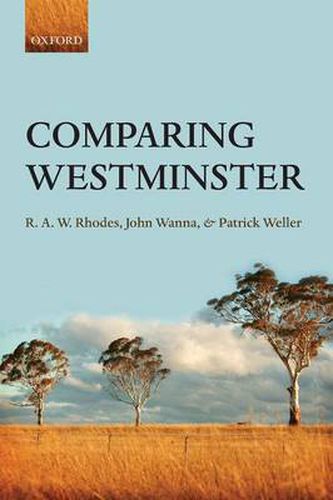Comparing Westminster
R. A.W. Rhodes (Professor of Government, University of Tasmania),John Wanna (Sir John Bunting Professor of Politics and Public Administration, Research School of Social Sciences, Australian National University and Professor in Public Policy, Griffith University),Patrick Weller (Professor of Politics and Public Policy, Premier of Queensland Chair of Governance and Public Policy, Griffith University.)

Comparing Westminster
R. A.W. Rhodes (Professor of Government, University of Tasmania),John Wanna (Sir John Bunting Professor of Politics and Public Administration, Research School of Social Sciences, Australian National University and Professor in Public Policy, Griffith University),Patrick Weller (Professor of Politics and Public Policy, Premier of Queensland Chair of Governance and Public Policy, Griffith University.)
Comparing Westminster explores how the governmental elites in Australia, Britain, Canada, New Zealand, and South Africa understand their Westminster system. It examines in detail four interrelated features of Westminster systems. Firstly, the increasing centralisation in collective, responsible cabinet government. Second, the constitutional convention of ministerial and collective responsibility. Third, the role of a professional, non-partisan public service. And finally, parliament’s relationship to the executive. The authors explain the changes that have occured in the Westminster model by analysing four traditions: royal prerogative, responsible government, constitutional bureaucracy, and representative government. They suggest that each tradition has a recurring dilemma, between centralisation and decentralisation, party government and ministerial responsibility, professionalisation and politicisation, and finally elitism and participation. They gone on to argue that these dilemmas recur in four present-day debates: the growth of prime ministerial power, the decline in individual and collective ministerial accountability, politicisation of the public service, and executive dominance of the legislature. They conclude by identifying five meanings of - or narratives about - Westminster. Firstly, ‘Westminster as heritage’ - elite actors’ shared governmental narrative understood as both precedents and nostalgia. Second, ‘Westminster as political tool’ - the expedient cloak worn by governments and politicians to defend themselves and criticise opponents. Third, ‘Westminster as legitimising tradition’ - providing legitimacy and a context for elite actions, serving as a point of reference to navigate this uncertain world. Fourth, ‘Westminster as institutional category’ - it remains a useful descriptor of a loose family of governments with shared origins and characteristics. Finally, ‘Westminster as an effective political system’ - it is a more effective and efficient political system than consensual parliamentary governments. Westminster is a flexible family of ideas that is useful for many purposes and survives, even thrives, because of its meaning in use to elite actors.
This item is not currently in-stock. It can be ordered online and is expected to ship in approx 2 weeks
Our stock data is updated periodically, and availability may change throughout the day for in-demand items. Please call the relevant shop for the most current stock information. Prices are subject to change without notice.
Sign in or become a Readings Member to add this title to a wishlist.

